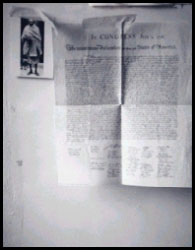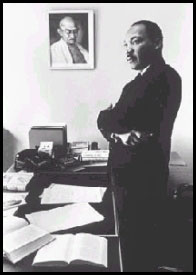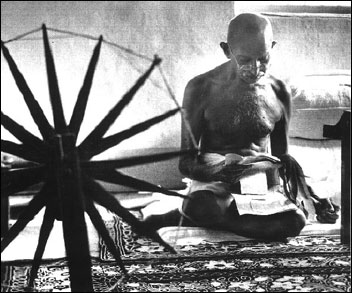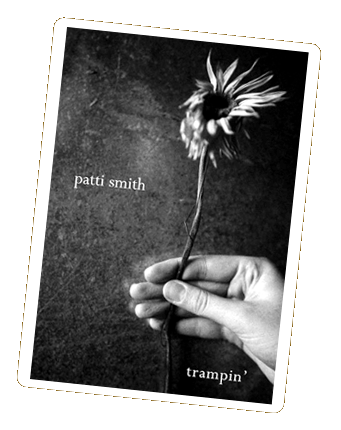patti
smith on trampin'
page five
gandhi
mahatma gandhi
october 2, 1869 - january 30, 1948
"what is faith
if not translated into action"
the leader of the
non-violent revolution that delivered india from 200 years of british rule. he
sought to unite his country and his people through prayer, fasting and civil disobedience.
he lived his belief that action for the sake of others delivers from bondage.
india reclaimed its independence in 1947. on january 30,1948 Gandhi was assassinated
with the words "Hey, Rama" (Oh, God) on his lips.
as
we approach our elections it is good to remember the power of collective action.
it is also good to remember Gandhi. for as Dr. Martin Luther King Jr. said "we
may ignore Gandhi at our own risk."
-patti smith
|

Photo
by Patti Smith |

Smith's passionate tribute to "Gandhi" is a spirited call to non-violent
revolution, which echoes her earlier anthem, "People Have The Power"
by urging the sleeping masses "to awake from their slumber, and get 'em with
the numbers." Interesting enough, there are references to holy men from most
of the world's great religions represented on the album - all of whom, quite naturally,
were pacifists.

Was there a particular event that stimulated you to want to do a song about
Gandhi - perhaps re-seeing the movie with Ben Kingsley?
PATTI
SMITH: Gandhi is always worthy of study. the song was improvised in the studio;
we made two passes at it, and that was it. I studied a lot about Gandhi, read
books he'd written and got my thoughts together, but there were no lyrics written.
Although Gandhi was largely improvised, how much structure
did you start out with?
PATTI SMITH: we didn't work
very much on Gandhi. we knew what our task was. i knew i wanted to tell the tale
over a simple chord progression, that it should have a certain feel, as in the
improvisational section of Land. I had improvised the opening lyrics live during
a long performance of rock n roll nigger and remembered them, placing them away
for the future. the recorded version was the second of two done as a demo. we
decided to let it stand. i did not adjust any lyrics. they stand as they came.
During any of the takes did you find any voices channeling
thoughts through you, as was the case with "Strange Messenger"?
PATTI
SMITH: it is not a channeling style song. it is narrative. the voice is my own.
Would
you say you have a natural gift for improvisation, or did you find it was something
you could learn or develop further, by studying improvisational musicians like
John Coltrane?
PATTI SMITH: i have not studied it. i guess
it's just something i do.
It's interesting to contrast
the revolutionary tactics of Gandhi (who inspired Martin Luther King), against
those of Thomas Jefferson (who inspired Ho Chi Minh). What attracts you to write
about such diverse revolutionary figures?
PATTI SMITH:
their work. |

|

"If humanity is to progress, Gandhi is inescapable.
He lived, thought and acted, inspired by the vision of humanity evolving toward
a world of peace and harmony. We may ignore him at our own risk."
-Dr.
Martin Luther King, Jr.


Some
quotes from Mahatma Gandhi
"I
object to violence because when it appears to do good, the good is only temporary;
the evil it does is permanent."

"I have learnt through bitter experience the one
supreme lesson - to conserve my anger, and as heat conserved is transmitted into
energy, even so our anger controlled can be transmuted into a power which can
move the world."

"Truth resides in every human heart, and one has
to search for it there, and to be guided by truth as one sees it. But no one has
a right to coerce others to act according to his own view of truth."

"I
have not the shadow of a doubt that any man or woman can achieve what I have,
if he or she would make the same effort and cultivate the same hope and faith."

|
|

|





